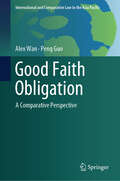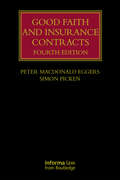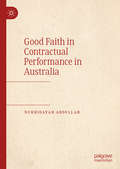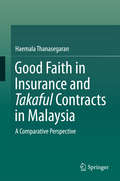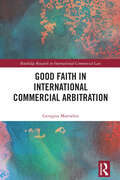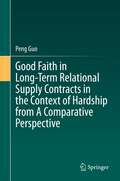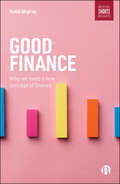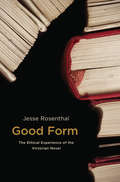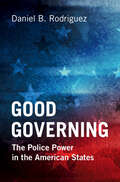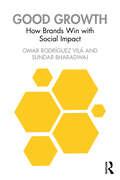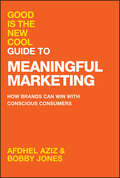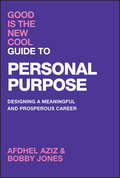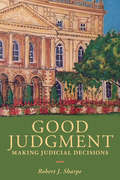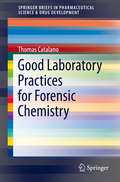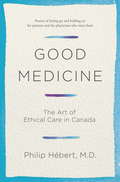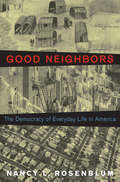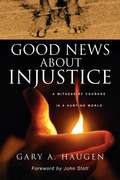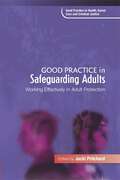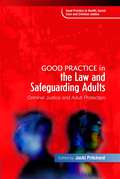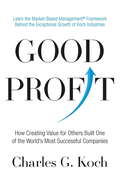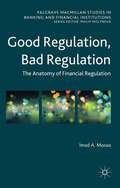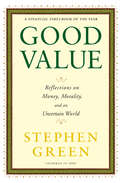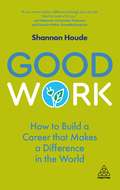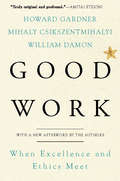- Table View
- List View
Good Faith Obligation: A Comparative Perspective (International and Comparative Law in the Asia Pacific)
by Peng Guo Alex WanThis book provides a study on the relevance of good faith obligation with a specific focus on Australia and China. Good faith has been hailed as one of the most important unresolved contractual issues in contract law. There have been numerous judicial approaches over the years to articulate a baseline for good faith application; however, the direction taken in dealing with this important issue is generally unsatisfactory, both in producing a coherent understanding of the role and sustaining a uniform application of good faith in contracts. This book concentrates on examining whether the continued relevance of good faith in arm’s length contractual relationships based on the reasonable expectations of the contracting parties can be maintained. To accomplish this, good faith is examined by revisiting the legal approaches from a comparative perspective in understanding whether there is a continuing role for good faith in commercial contracts.
Good Faith and Insurance Contracts (Lloyd's Insurance Law Library)
by Peter MacDonald Eggers Simon PickenGood Faith and Insurance Contracts sets out an exhaustive analysis of the law concerning the duty of utmost good faith, as applied to insurance contracts. Now in its fourth edition, it has been updated to address the arrival of the Insurance Act 2015, as well as any references to new case law. In addition, it synthesises all known judicial decisions by the English Courts concerning good faith in this area. This book is still the only text devoted to a discussion of the duty of utmost good faith applicable to insurance contracts. As good faith is an issue which arises in respect of all insurance contracts, it is a book which will be extremely useful to lawyers involved in insurance as well as insurance practitioners.
Good Faith in Contractual Performance in Australia
by Nurhidayah AbdullahThis book gives a detailed account of the current state of the law concerning good faith in contractual performance in Australia, through an empirical study on its reception and development across the various Australian jurisdictions.In Australia, good faith received wide attention after Priestly J introduced in his obiter comments in Renard Construction (ME) v Minister for Works (1992) 26 NSWLR 234.This book focuses on the attitude of the judges to good faith, the definition of good faith, and the possibility of legislating a good faith obligation in Australian contract law. This book also discusses the issues surrounding its development, its meaning, and acceptance at the international level.The empirical legal research adopted in this book will offer a significant contribution in understanding the concept of good faith in Australia from the empirical perspective.
Good Faith in Insurance and Takaful Contracts in Malaysia
by Haemala ThanasegaranThis book examines good faith in non-marine insurance and takaful (Islamic insurance) contracts in Malaysia, and proposes holistic law reform of the same. The first two-thirds of the book comprise an extensive comparative legal analysis of the issues between Malaysia, Australia and the United Kingdom, with the final third dedicated to a socio-economic analysis of law reform and suggestions for law reform particularly suited to Malaysia. The book evaluates whether the duty of utmost good faith (the cornerstone of insurance and takaful contracts) is effectively regulated and, in turn, observed by insurers (and takaful operators) and insureds alike in Malaysia. The adequacy of the Insurance Act 1996 (Malaysia), the Takaful Act 1984 (Malaysia), the Financial Services Act 2013 (Malaysia) and the Islamic Financial Services Act 2013 (Malaysia) is evaluated, along with the supporting infrastructure and oversight measures introduced by the Malaysian government. In doing so, The book examines the duty of utmost good faith from both a doctrinal and a social science perspective, in order to propose suitable legal reform.
Good Faith in International Commercial Arbitration (Routledge Research in International Commercial Law)
by Georgios MartsekisThis book demystifies the effectiveness of good faith in international commercial arbitration law.In the growing universe of international commercial arbitration, it is more pressing than ever to discuss the role of good faith and challenge residual conservative skepticism regarding its usefulness. The book employs principles, standards and concepts which are normatively ingrained in good faith. These include the principle of pacta sunt servanda, the estoppel doctrine, the transnational standard of cooperation and fair dealing among merchants. It also discusses the pertinence of good faith to corrective justice, proportionality, prohibition of discrimination and unconscionability, international public policy and due process, among other concepts. This granular approach demonstrates how good faith is integrated into the practice of international commercial arbitration. The book sheds light on the technical functions of the principle in parties’ substantive protection, contractual interpretation and arbitral procedure, with an ultimate view to reinforcing the soundness and persuasive value of arbitral decision-making. Throughout, the book establishes a uniform and enforceable conceptualization of good faith in transnational disputes.The book will be of interest to practitioners and researchers in the fields of commercial law, arbitration, transnational disputes and international law.
Good Faith in Long-Term Relational Supply Contracts in the Context of Hardship from A Comparative Perspective
by Peng GuoThis book provides fair and acceptable solutions to hardship issues in long-term relational supply contracts. This book uses an approach to strike a balance between the traditional approach underlying classical contract law which emphasises the almost absolute prevalence of the principle of pacta sunt servanda and a flexible approach that is based on the principle of clausula rebus sic stantibus. This book argues for an emerging principle of pacta sunt servanda bona fide on the basis of the relational contract theory. Additionally, this book demonstrates how good faith can serve as a foundation for imposing a duty to renegotiate on the parties. The aim of this book is rather to propose how relational contract theory can be applied to the analysis of specific legal rules in general. Lastly, this boos highlights how the duty to renegotiate and the power to adapt a contract can be further developed upon the occurrence of hardship, based on good faith and the relational nature and characteristics of a long-term relational supply contract. This book explores and enriches the existing research on relational contract theory concentrates primarily on its application in domestic contract laws, particularly in the regulation of long-term contracts in American contract law. As an outcome this book provides a more feasible and satisfactory approach for courts or arbitral tribunals to undertake when facing hardship issues in international contract disputes. Overall, hardship themes, long-term relational supply contracts and good faith are examined extensively.
Good Finance: Why We Need a New Concept of Finance
by Vedat AkgirayJust as we need good food for good health, so too do we need ‘good finance’ for social and economic wellness. In this book, Vedat Akgiray presents a timely critique of extreme financialisation, of the economics profession’s flawed modelling approach and the continuing blind faith in the efficient market hypothesis. Outlining the causes of financial crises and their socioeconomic effects, Good Finance puts the issues into perspective. It offers a clear platform upon which our current concept of finance can be revised for the good of society.
Good Form: The Ethical Experience of the Victorian Novel
by Jesse RosenthalWhat do we mean when we say that a novel's conclusion "feels right"? How did feeling, form, and the sense of right and wrong get mixed up, during the nineteenth century, in the experience of reading a novel? Good Form argues that Victorian readers associated the feeling of narrative form--of being pulled forward to a satisfying conclusion--with inner moral experience. Reclaiming the work of a generation of Victorian "intuitionist" philosophers who insisted that true morality consisted in being able to feel or intuit the morally good, Jesse Rosenthal shows that when Victorians discussed the moral dimensions of reading novels, they were also subtly discussing the genre's formal properties.For most, Victorian moralizing is one of the period's least attractive and interesting qualities. But Good Form argues that the moral interpretation of novel experience was essential in the development of the novel form--and that this moral approach is still a fundamental, if unrecognized, part of how we understand novels. Bringing together ideas from philosophy, literary history, and narrative theory, Rosenthal shows that we cannot understand the formal principles of the novel that we have inherited from the nineteenth century without also understanding the moral principles that have come with them. Good Form helps us to understand the way Victorians read, but it also helps us to understand the way we read now.
Good Governance for Pension Schemes
by Paul Thornton Donald FlemingRegulatory and market developments have transformed the way in which UK private sector pension schemes operate. This has increased demands on trustees and advisors and the trusteeship governance model must evolve in order to remain fit for purpose. This volume brings together leading practitioners to provide an overview of what today constitutes good governance for pension schemes, from both a legal and a practical perspective. It provides the reader with an appreciation of the distinctive characteristics of UK occupational pension schemes, how they sit within the capital markets and their social and fiduciary responsibilities. Providing a holistic analysis of pension risk, both from the trustee and the corporate perspective, the essays cover the crucial role of the employer covenant, financing and investment risk, developments in longevity risk hedging and insurance de-risking, and best practice scheme administration.
Good Governing: The Police Power in the American States
by Daniel B. RodriguezGood Governing: The Police Power in the American States is a deep historical and legal analysis of state police power, examining its origins in the founding period of the American public through the 20th century. The book reveals how American police power was intended to be a broad, but not unlimited, charter of regulatory governance, designed to implement key constitutional objectives and advance the general welfare. It explores police power's promise as a mechanism for implementing successful regulatory governance and tackling societal ills, while considering key structural issues like separation of powers and individual rights. This insightful book will shape understanding of the neglected state police power, a key part of constitutional governance in the U.S. This title is also available as Open Access on Cambridge Core.
Good Growth: How Brands Win with Social Impact
by Omar Rodriguez Vila Sundar BharadwajBusiness has a sustainability problem—and sustainability has a business problem, as many companies are fearful of engaging with social and environmental issues, owing to the costs and risks.Addressing these dual challenges head on, this book provides a blueprint for putting social and environmental benefits at the center of a company’s growth agenda. Many sustainability books offer 30,000-foot strategic views and broad-brush guidance on the business of “doing well by doing good,” but here is a ground-level guide for profitably integrating social and environmental benefits into individual products and brands. The book introduces the rapidly emerging phenomenon of social impact markets and shows how companies can capitalize on these new pockets of consumer demand through focused strategy, data-informed implementation, and a clear eye on the future, including how digital technologies are creating new ways for brands to expand their social impact and make social mission a central element of competitive strategy.Weaving together rich case studies and practical tools, this research-backed and real-world-ready guide fills a critical niche: a hands-on strategy playbook for the executives charged with driving brands’ top-line growth, making it essential reading for C-suite leaders, R&D, product, and brand managers, board members, NGOs, as well as MBA and executive education students.
Good Is the New Cool Guide to Meaningful Marketing: How Brands Can Win with Conscious Consumers
by Bobby Jones Afdhel AzizHow brands can evolve to win with conscious consumers The Good Is the New Cool Guide to Meaningful Marketing is your guide to future-proof your brand with purpose-driven strategies and activations that meet the demands of the new world of conscious capitalism. This book takes readers behind the scenes at some of the world's most famous brands—from purpose-driven pioneers like TOMS, the Honest Company, and Chobani, to household names like Oreo, Call of Duty, and Brand Jordan—to show you how a new wave of marketers are collaborating with values-driven creators of cool like Pharrell, Lady Gaga, and Justin Bieber. In this book, readers will learn about: How brands can authentically discover and deploy their social purpose in ways that drive brand love and financial growth The Seven Steps of Meaningful Marketing, including “Think Citizens Not Consumers,” “Solve Problems from the Everyday to the Epic,” and “People are the New Media” How brands can collaborate with nonprofits to make money and do good at the same time, using examples from Product(RED), Rivet, and Choose Love The Good Is the New Cool Guide to Meaningful Marketing earns a well-deserved spot on the bookshelves of all forward-thinking leaders in business, from startups to Fortune 500 companies, seeking to ride the winds of change and market in a better, more meaningful way.
Good Is the New Cool Guide to Personal Purpose: Designing a Meaningful and Prosperous Career
by Bobby Jones Afdhel AzizHow to Supercharge Your Career with Purpose and Impact At a time when employee engagement has never been lower, the Good Is the New Cool Guide to Personal Purpose: Designing a Meaningful and Prosperous Career helps employees bring their full selves to work by helping them discover and use their personal Purpose to fuel their careers. This can lead to higher levels of physical, emotional, and mental health, as well as huge benefits to organizations in the form of higher levels of engagement, innovation, recruitment, and retention. This book explores the ground-breaking GPS to Purpose framework for finding Personal Purpose, helping readers pinpoint their Gifts, Passions, and how they can be of Service to others, and in the process drive business growth through solving social and environmental problems. With ideas applied at Fortune 500 companies like Adidas, PepsiCo, Microsoft, and others, this book discusses topics including: Explaining what Personal Purpose is in a clear and accessible way Unpacking the many mental, physical, and financial benefits of finding Purpose How to unleash your inner ‘Intrapreneur’ at work How to write an inspiring Living Vision for your life—and your work The Good Is the New Cool Guide to Personal Purpose earns a well-deserved spot on the bookshelves of all employees seeking to design a career that is both meaningful and successful—and help them drive growth in an entrepreneurial way through solving social and environmental problems.
Good Judgment: Making Judicial Decisions
by Robert SharpeGood Judgment, based upon the author's experience as a lawyer, law professor, and judge, explores the role of the judge and the art of judging. Engaging with the American, English, and Commonwealth literature on the role of the judge in the common law tradition, Good Judgment addresses the following questions: What exactly do judges do? What is properly within their role and what falls outside? How do judges approach their decision-making task? In an attempt to explain and reconcile two fundamental features of judging, namely judicial choice and judicial discipline, this book explores the nature and extent of judicial choice in the common law legal tradition and the structural features of that tradition that control and constrain that element of choice. As Sharpe explains, the law does not always provide clear answers, and judges are often left with difficult choices to make, but the power of judicial choice is disciplined and constrained and judges are not free to decide cases according to their own personal sense of justice. Although Good Judgment is accessibly written to appeal to the non-specialist reader with an interest in the judicial process, it also tackles fundamental issues about the nature of law and the role of the judge and will be of particular interest to lawyers, judges, law students, and legal academics.
Good Laboratory Practices for Forensic Chemistry
by Thomas CatalanoGood Laboratory Practices for Forensic Chemistry acknowledges the limitations that often challenge the validity of data and resultant conclusions. Eight chapters examine current practices in analytical chemistry as well as business practices, guidelines and regulations in the pharmaceutical industry to offer improvements to current practices in forensic chemistry. It discusses topics ranging from good manufacturing practices (GMP), good laboratory practices (GLP), the International Conference on Harmonisation (ICH), quality assurance (QA), and quality risk management (QRM), among others. This book is a guide for scientists, professors, and students interested in expanding their knowledge of forensic chemistry.
Good Medicine
by Philip HebertAward-winning physician Philip C. Hébert creates a brave and intimate portrait of the complex ethical imperatives at the heart of good medicine: doctors do not have all the answers; patients must be heard; and their needs, desires, fears, and experiences must be reflected in how practitioners look after them. Medical science continues to advance to previously unimagined heights in its diagnostic and treatment capabilities. With these advances, however, come unexpected ethical dilemmas for practitioners, patients, and families. In Good Medicine, Dr. Hébert approaches these questions of pressing and fundamental importance from the dual point of view of acclaimed physician and long-time patient. With remarkable balance and sensitivity, he explores a range of politically, constitutionally, and ethically contentious matters, including assisted suicide, treatment refusal and suspension, and the overall allocation of medical resources. Hébert pairs his artful analysis with the real-life, often deeply moving stories of those who have lived these challenges. Hébert offers piercing and compassionate insight into the relationship between patients and medical professionals, and guides readers towards the open and empathetic communication needed to ensure good medicine for everyone.From the Hardcover edition.
Good Neighbors: The Democracy of Everyday Life in America
by Nancy L. Rosenblum"Love thy neighbor" is an impossible exhortation. Good neighbors greet us on the street and do small favors, but neighbors also startle us with sounds at night and unleash their demons on us, they monitor and reproach us, and betray us to authorities. The moral principles prescribed for friendship, civil society, and democratic public life apply imperfectly to life around home, where we interact day to day without the formal institutions, rules of conduct, and means of enforcement that guide us in other settings. In Good Neighbors, Nancy Rosenblum explores how encounters among neighbors create a democracy of everyday life, which has been with us since the beginning of American history and is expressed in settler, immigrant, and suburban narratives and in novels, poetry, and popular culture. During disasters, like Hurricane Katrina, the democracy of everyday life is a resource for neighbors who improvise rescue and care. Degraded, this framework can give way to betrayal by neighbors, as faced by the Japanese Americans interned during World War II, or to terrible violence such as the lynching of African Americans. Under extreme conditions the barest act of neighborliness is a bulwark against total ethical breakdown. The elements of the democracy of everyday life--reciprocity, speaking out, and "live and let live"--comprise a democratic ideal not reducible to public principles of justice or civic virtue, but it is no less important. The democracy of everyday life, Rosenblum argues, is the deep substrate of democracy in America and can be its saving remnant.
Good News About Injustice: A Witness of Courage in a Hurting World
by Gary A. HaugenGary Haugen says "the good news about injustice is that God is against it!" Offering his own and others' stories alongside proven, practical strategies, he shows how you too can stand against injustice wherever it occurs.
Good Practice in Safeguarding Adults: Working Effectively in Adult Protection
by Jackie Parker Jacki Pritchard Simon Leslie Alison Bowes Adrian Hayes Adrian Hughes Lucy Naven Marilyn Mornington Sherry Bien Macintosh Seena Fazel Peter Sadler Arwel Owen Jamieson Mornington Deborah Kitson Gary Fitzgerald Ghizala AvanGood Practice in Safeguarding Adults provides an up to date and topical overview of developments in policy, guidance, legislation and practice in the area of adult protection. The book aims to broaden thinking about adult abuse, assesses alternative models of practice such as criminal justice and welfare, and covers groups who may be overlooked, such as people with brain injuries, older prisoners and adults within the black and minority ethnic communities. Issues covered include domestic violence and honour-based crime, abuse in institutions, financial abuse, and risk assessment in adult protection. The book is illustrated throughout with case studies, and also gives a voice to the victims of adult abuse who can be forgotten in a working environment that emphasises target performance, indicators, standards, star ratings, paperwork and correct use of terminology. This book will be essential reading for anyone working with vulnerable adults, including social workers, care managers, care workers, health care staff, police, probation officers, staff within the prison system, advocates, volunteers, training officers and students.
Good Practice in the Law and Safeguarding Adults: Criminal Justice and Adult Protection
by Glyn Hughes Jacki Pritchard Simon Leslie Kathryn Stone David Hewitt Adrian Hughes Marilyn Mornington Peter Sadler Teresa Gorczynska Rob Harris Geraldine Monaghan Alan Noel Carter Mark Pathak Kathryn Mackay Steve Kirkpatrick Penny LettsGood Practice in the Law and Safeguarding Adults provides an up-to-date summary of developments in the legislative framework and best practice relevant to the area of adult protection work. It explains legislation that can be used in adult protection work, covering criminal and civil law, and crucial national guidance such as Achieving Best Evidence. Issues covered include confidentiality and information-sharing in adult protection work, capacity issues, police investigations, financial abuse, advocacy, witness support and honour-based violence. The book is illustrated throughout with case studies and good practice points. This book will be essential reading for anyone working with vulnerable adults, including health and social care workers, care managers, support workers, volunteers, advocates, police, probation staff, prison staff, lawyers training officers and students.
Good Profit: How Creating Value for Others Built One of the World's Most Successful Companies
by Charles G. KochA NEW YORK TIMES BESTSELLERIn 1961, Charles Koch joined his father's Wichita-based company, then valued at $21 million. Six years later, following his father's death, he was named chairman of the board and CEO of Koch Industries, Inc. Today, Koch Industries' estimated worth is $100 billion - making it one of the largest private companies in the world. Koch exceeds the S&P 500's five-decade growth by 27-fold, and plans to double its value on average every six years. What exactly does this company do and why is it so remarkably profitable? While you won't find the Koch name on your stain-resistant carpet, stretch denim jeans, the connectors in your smartphone or your baby's ultra-absorbent diapers, Charles Koch's Market-Based Management® system, intended to generate good profit, drove these innovations and many more. Good profit results from products and services that customers vote for freely with their money; products that help improve people's lives. It results from a culture where employees are empowered to act entrepreneurially to discover customer preferences and the best ways to satisfy them. Good profit is the earnings that follow when long-term value is created for everyone - customers, employees, shareholders and society. Readers will learn to:· Craft a vision for how a business can thrive in spite of disruption and ever-changing consumer values· Find and retain a workforce possessing both virtue and talent (the first being the more important)· Award employees with ownership and decision rights based on their comparative advantages and proven contributions, rather than job title· Motivate all employees to maximise their contributions with effectively structured incentives so employees' compensation is limited only by the value they create - not budgets or company-wide policy A must-read for any leader, entrepreneur or student, as well as those who want a more civil, fair and prosperous society, GOOD PROFIT is destined to rank as one of the greatest management books of all time.
Good Regulation, Bad Regulation
by Imad A. MoosaSince the 2007 2008 global financial crisis, there has been much debate about the role of financial regulation and the causes of financial instability in the industry. Where studies commonly question the value of a regulated rather than free market , this book focuses on the differentiation of 'good regulation' and 'bad regulation'. This book highlights the need for financial regulation to combat corruption, and the integral link that exists between corruption and financial instability. The author evaluates the benefits and shortcomings of specific types of regulation, drawing on recent examples to illustrate each argument. The book presents compelling arguments for the regulation of leverage, liquidity, payday loans and securitisation; and debates the negative aspects of the regulation of short selling, and high-frequency trading, and of Basel-style banking regulation. The author argues that there is no free-market solution to financial instability, and rejects the idea of 'too big to fail'.
Good Value: Reflections on Money, Morality and an Uncertain World
by Stephen GreenCan one be both an ethical person and an effective businessperson? Stephen Green, an ordained priest and the chairman of HSBC, thinks so. In Good Value, Green retraces the history of the global economy and its financial systems, and shows that while the marketplace has delivered huge advantages to humanity, it has also abandoned over a billion people to extreme poverty, encouraged overconsumption and debt, and ravaged the environment.How do we reconcile the demands of capitalism with both the common good and our own spiritual and psychological needs as individuals? To answer that, and some of the most vexing questions of our age, Green takes us on a lively and erudite journey through history, looking for lessons in the work of economists and philosophers, businessmen and poets, theologians and novelists, playwrights and political scientists. An essential business book by a man who is uniquely qualified to write it, Good Value is a timely and persuasive analysis of the most pressing financial and moral questions we face.
Good Work: How to Build a Career that Makes a Difference in the World
by Shannon HoudeDo you want to have a positive impact on the world? Do you want to have a successful career that makes a difference? In short... do you want to do Good Work? Let this step-by-step guide show you how. Packed with useful tools and exercises, this step-by-step guide will help you figure out your passion and purpose, and how to effectively harness it to make real and positive change - on the world, and on your career. Whether you want to battle climate change, promote diversity and inclusion, work in sustainability - or if you're not sure, but just want to leave things a little better at the end of every work day - let this book support you in turning that passion into action. Written by corporate responsibility consultant and certified coach Shannon Houde, this book is part career guide and part job search help - and all purpose-driven. From understanding what the 'purpose economy' is and how you fit into it, to what jobs to go for and how to land them, Good Work is the helping hand you need to make a career out of changing the world.
Good Work: When Excellence and Ethics Meet
by Howard GardnerWhat does it mean to carry out "good work"? What strategies allow people to maintain moral and ethical standards at a time when market forces wield unprecedented power and work life is being radically altered by technological innovation? These are the questions at the heart of this important collaboration by three leaders in psychology. Enlivened with stories of real people facing hard decisions, Good Work offers powerful insight into one of the most important issues of our time and, indeed, into the future course of science, technology, and communication.
